If you’re on the hunt for some words of wisdom from one of America’s Founding Fathers, then this collection with 120 of the best Alexander Hamilton quotes might just be perfect for you.
Alexander Hamilton was the principal author of the Federalist Papers, and in this list, we’re bringing you quotes that focus on just that—plus a little bit more about liberty, rights, and development.
So, be sure not to miss out!
Continue to the list below.
And make sure to read these John Adams quotes.
Best Alexander Hamilton Quotes

1. “I never expect a perfect work from an imperfect man.”
2. “Hard words are very rarely useful. Real firmness is good for everything. Strut is good for nothing.”
3. “The constitution shall never be construed to prevent the people of the United States who are peaceable citizens from keeping their own arms.”
4. “History will teach us that the former has been found to be a much more certain road to the introduction of despotism than the latter, and that, of those men who have overturned the liberties of republics, the greatest number have begun their career by paying an obsequious court to the people; commencing demagogues, and ending tyrants.”

5. “Who talks most about freedom and equality? Is it not those who hold the bill of rights in one hand and a whip for affrighted slaves in the other?”
6. “Safety from external danger is the most powerful director of national conduct. Even the ardent love of liberty will, after a time, give way to its dictates.”
7. “Those who stand for nothing fall for everything.”
8. “The sacred rights of mankind are not to be rummaged for among old parchments or musty records. They are written, as with a sunbeam, in the whole volume of human nature, by the hand of divinity itself, and can never be erased or obscured by mortal power.”
9. “The best we can hope for concerning the people at large is that they be properly armed.”

10. “A nation which can prefer disgrace to danger is prepared for a master, and deserves one.”
11. “A well-adjusted person is one who makes the same mistake twice without getting nervous.”
12. “There are approximately 1,010,300 words in the English language, but I could never string enough words together to properly express how much I want to hit you with a chair.”
13. “Give all the power to the many, they will oppress the few. Give all the power to the few, they will oppress the many.”
14. “There are seasons in every country when noise and impudence pass current for worth; and in popular commotions especially, the clamors of interested and factious men are often mistaken for patriotism.”
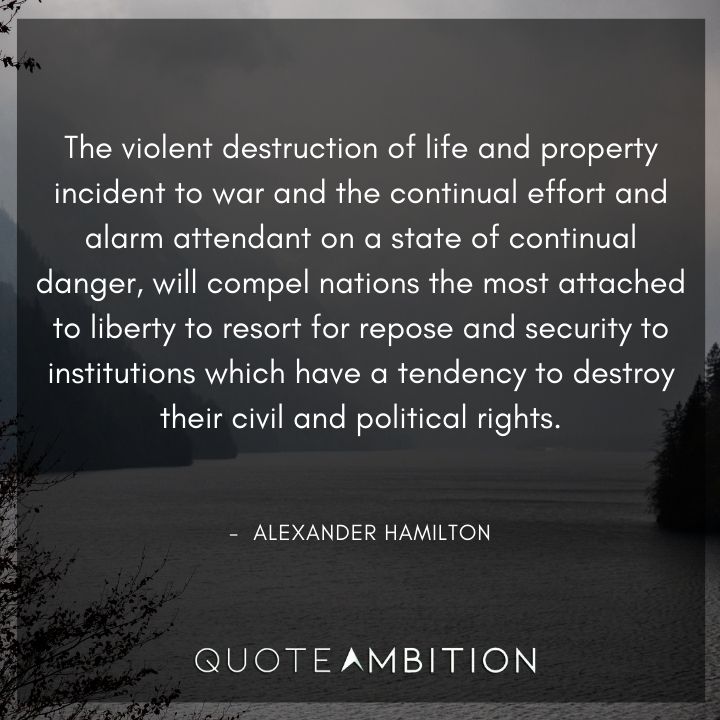
15. “The violent destruction of life and property incident to war and the continual effort and alarm attendant on a state of continual danger, will compel nations the most attached to liberty to resort for repose and security to institutions which have a tendency to destroy their civil and political rights.”
16. “The art of reading is to skip judiciously.”
17. “I have thought it my duty to exhibit things as they are, not as they ought to be.”
18. “Why has the government been instituted at all? Because the passions of man will not conform to the dictates of reason and justice without constraint.”
19. “Those then, who resist a confirmation of public order, are the true artificers of monarchy—not that this is the intention of the generality of them.”
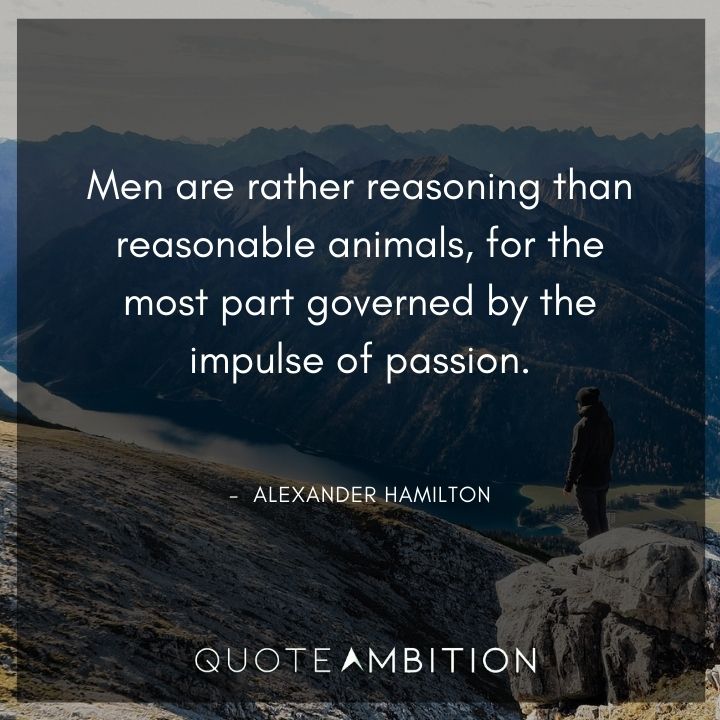
20. “Men are rather reasoning than reasonable animals, for the most part governed by the impulse of passion.”
Alexander Hamilton Quotes on Freedom and Society
21. “A powerful, victorious ally is yet another name for master.”
22. “Vigor of government is essential to the security of liberty.”
23. “The truth unquestionably is, that the only path to a subversion of the republican system of the country is, by flattering the prejudices of the people, and exciting their jealousies and apprehensions, to throw affairs into confusion, and bring on civil commotion.”
24. “Let us recollect that peace or war will not always be left to our option; that however moderate or unambitious we may be, we cannot count upon the moderation, or hope to extinguish the ambition of others.”

25. “There is a certain enthusiasm in liberty that makes human nature rise above itself—in acts of bravery and heroism.”
26. “The voice of the people has been said to be the voice of God; and however generally this maxim has been quoted and believed, it is not true to fact. The people are turbulent and changing. They seldom judge or determine right.”
27. “Let him beware of an obstinate adherence to party; let him reflect that the object upon which he is to decide is not a particular interest of the community, but the very existence of the nation.”
28. “Men of factious tempers, of local prejudices, or of sinister designs, may, by intrigue, by corruption, or by other means, first obtain the suffrages, and then betray the interests, of the people.”
29. “The kindred blood which flows in the veins of American citizens, the mingled blood which they have shed in defense of their sacred rights, consecrate their Union, and excite horror at the idea of their becoming aliens, rivals, enemies.”
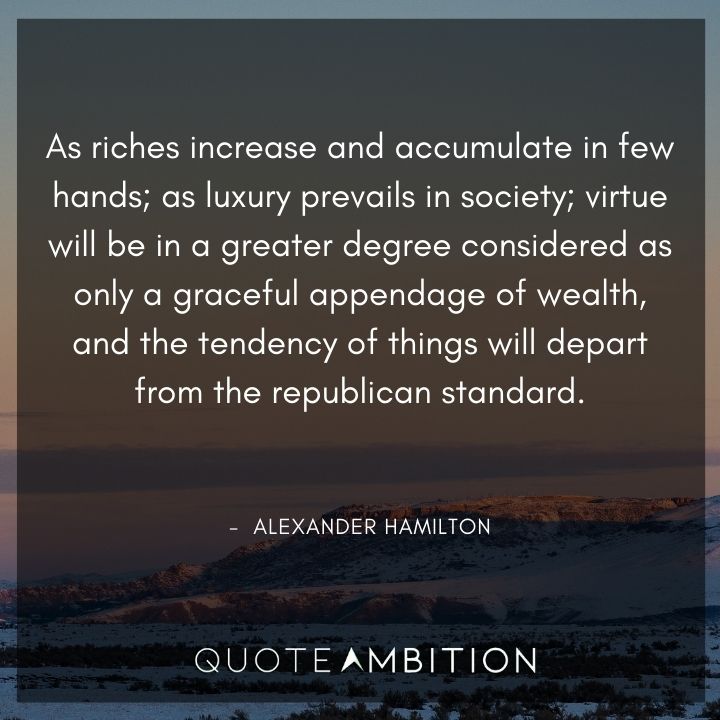
30. “As riches increase and accumulate in few hands; as luxury prevails in society; virtue will be in a greater degree considered as only a graceful appendage of wealth, and the tendency of things will depart from the republican standard.”
31. “All communities divide themselves into the few and the many—the first are the rich and well-born, the other the mass of the people.”
32. “This circumstance, if duly attended to, would furnish a lesson of moderation to those who are ever so much persuaded of their being in the right in any controversy.”
33. “Schemes to subvert the liberties of a great community require time to mature them for execution.”
34. “An army, so large as seriously to menace those liberties, could only be formed by progressive augmentations; which would suppose, not merely a temporary combination between the legislature and executive, but a continued conspiracy for a series of time.”

35. “Divisions at home would invite dangers from abroad.”
36. “There are men who, under any circumstances, will have the courage to do their duty at every hazard.”
37. “Am I, then, more of an American than those who drew their first breath on American ground?”
38. “When a people or family so divide, it never fails to be against themselves.”
39. “To watch the progress of such endeavors is the office of a free press.”

40. “To be more safe, they at length become willing to run the risk of being less free.”
41. “The circumstances that endanger the safety of nations are infinite; and for this reason, no constitutional shackles can wisely be imposed on the power to which the care of it is committed.”
42. “A frequent change of men will result from a frequent return of elections; and a frequent change of measures from a frequent change of men.”
43. “Power controlled or abridged is almost always the rival and enemy of that power by which it is controlled or abridged.”
44. “They formed it almost as soon as they had a political existence; not at a time when their habitations were in flames, when many of their citizens were bleeding, and when the progress of hostility and desolation left little room for those calm and mature inquiries and reflections which must ever precede the formation of a wise and well-balanced government for a free people.”

45. “The spirit of commerce has a tendency to soften the manners of men and to extinguish those inflammable humors which have so often kindled into wars.”
46. “It ought not to be forgotten that the demon of faction will, at certain seasons, extend his sceptre over all numerous bodies of men.”
47. “Liberty is to faction what air is to fire—an aliment without which it instantly expires.”
Alexander Hamilton Quotes on Rights and the Constitution
48. “For in politics, as in religion, it is equally absurd to aim at making proselytes by fire and sword. Heresies in either can rarely be cured by persecution.”
49. “If we must have an enemy at the head of government, let it be one whom we can oppose, and for whom we are not responsible.”
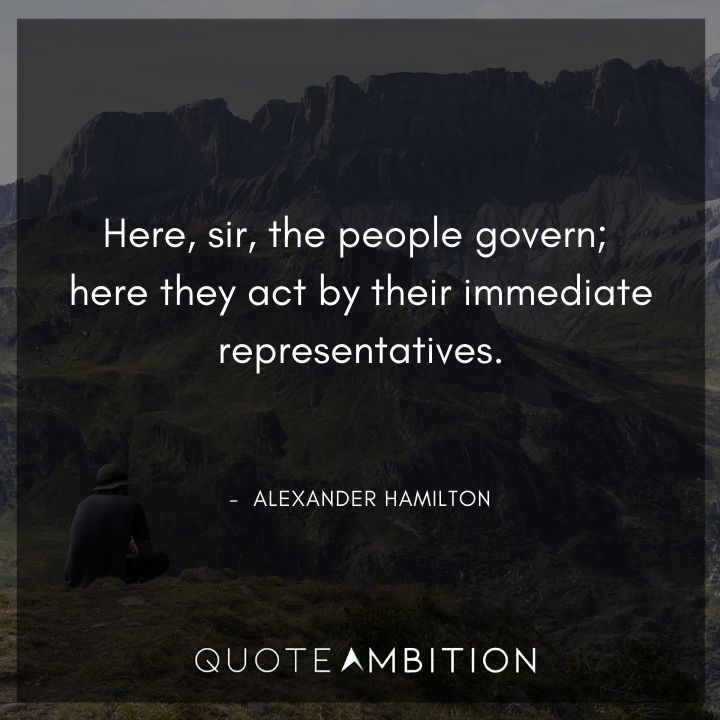
50. “Here, sir, the people govern; here they act by their immediate representatives.”
51. “The inquiry constantly is what will please, not what will benefit the people. In such a government, there can be nothing but temporary expedient, fickleness, and folly.”
52. “‘Divide and rule,’ must be the motto of every nation that either hates or fears us.”
53. “If the federal government should overpass the just bounds of its authority and make a tyrannical use of its powers, the people, whose creature it is, must appeal to the standard they have formed, and take such measures to redress the injury done to the Constitution as the exigency may suggest and prudence justify.”
54. “When avarice takes the lead in a state, it is commonly the forerunner of its fall.”
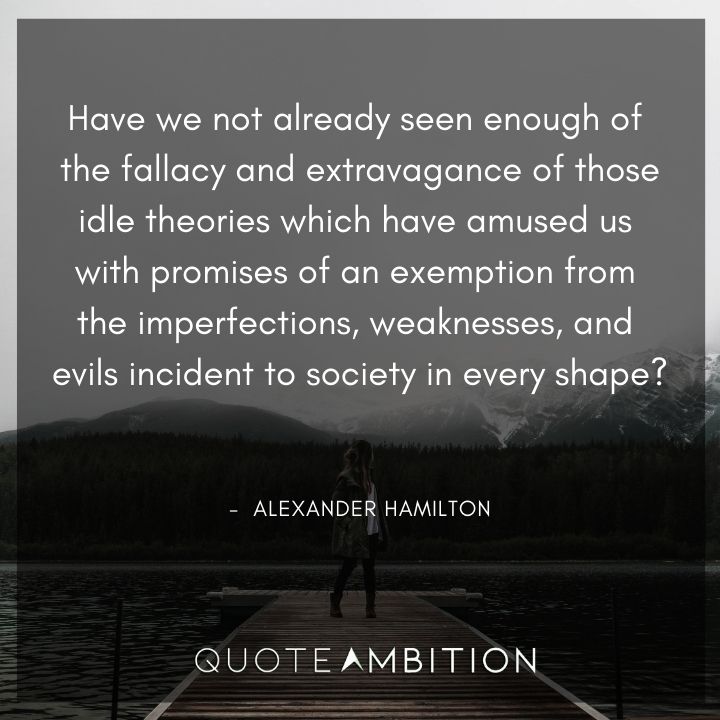
55. “Have we not already seen enough of the fallacy and extravagance of those idle theories which have amused us with promises of an exemption from the imperfections, weaknesses, and evils incident to society in every shape?”
56. “The complete independence of the courts of justice is peculiarly essential in a limited Constitution.”
57. “By a limited Constitution, I understand one which contains certain specified exceptions to the legislative authority; such, for instance, as that it shall pass no bills of attainder, no ‘ex post facto’ laws, and the like.”
58. “Limitations of this kind can be preserved in practice no other way than through the medium of courts of justice, whose duty it must be to declare all acts contrary to the manifest tenor of the Constitution void.”
59. “Is it not time to awake from the deceitful dream of a golden age, and to adopt as a practical maxim for the direction of our political conduct that we, as well as the other inhabitants of the globe, are yet remote from the happy empire of perfect wisdom and perfect virtue?”
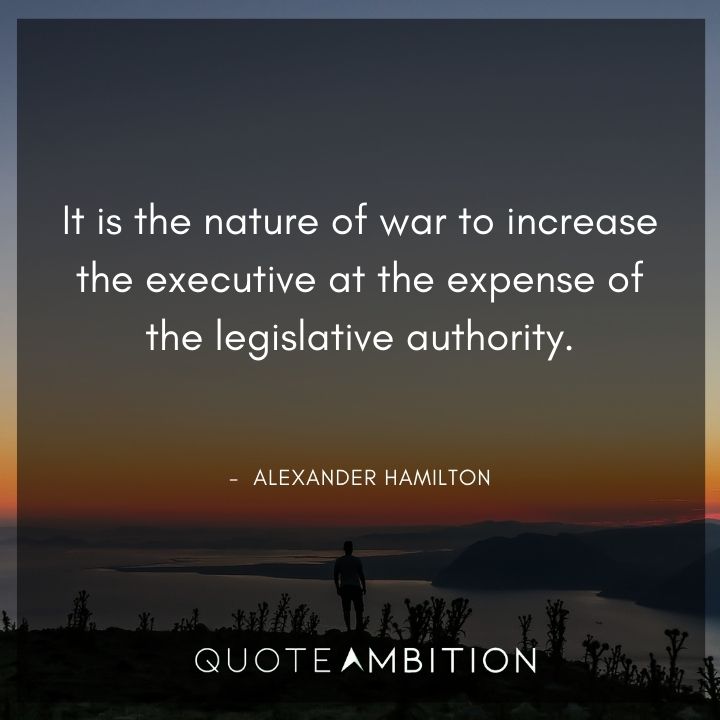
60. “It is the nature of war to increase the executive at the expense of the legislative authority.”
61. “The great and radical vice in the construction of the existing confederation is in the principle of legislation for states or governments, in their corporate or collective capacities, and as contradistinguished from the individuals of which they consist.”
62. “Is it not the glory of the people of America that, whilst they have paid a decent regard to the opinions of former times and other nations, they have not suffered a blind veneration for antiquity, for custom, or for names, to overrule the suggestions of their own good sense, the knowledge of their own situation, and the lessons of their own experience?”
63. “The fabric of American Empire ought to rest on the solid basis of the consent of the people.”
64. “Owing its ratification to the law of a state, it has been contended that the same authority might repeal the law by which it was ratified.”
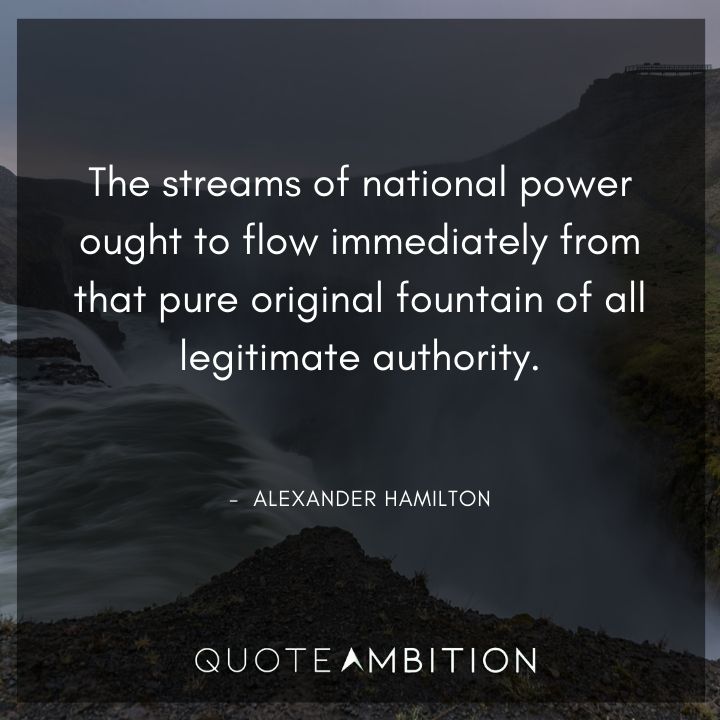
65. “The streams of national power ought to flow immediately from that pure original fountain of all legitimate authority.”
66. “To judge from the conduct of the opposite parties, we shall be led to conclude that they will mutually hope to evince the justness of their opinions, and to increase the number of their converts by the loudness of their declamations and the bitterness of their invectives.”
67. “A national debt, if it is not excessive, will be to us a national blessing.”
68. “Constitutions should consist only of general provisions; the reason is that they must necessarily be permanent, and that they cannot calculate for the possible change of things.”
69. “Government implies the power of making laws.”
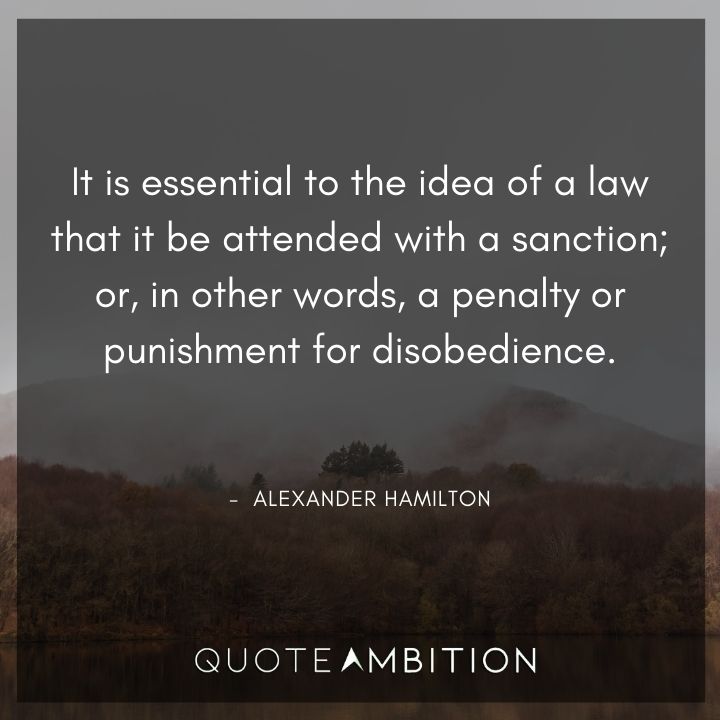
70. “It is essential to the idea of a law that it be attended with a sanction; or, in other words, a penalty or punishment for disobedience.”
71. “The President of the United States would be liable to be impeached, tried, and, upon conviction of treason, bribery, or other high crimes or misdemeanors, removed from office; and would afterwards be liable to prosecution and punishment in the ordinary course of law.”
72. “The fate of an empire is, in many respects, the most interesting in the world.”
73. “The true test of a good government is its aptitude and tendency to produce a good administration.”
74. “We are not always sure that those who advocate the truth are influenced by purer principles than their antagonists.”
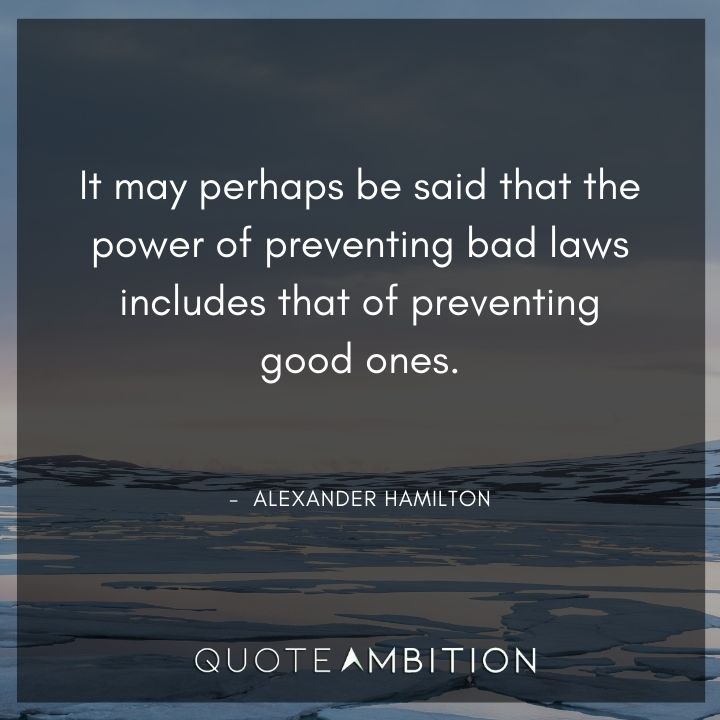
75. “It may perhaps be said that the power of preventing bad laws includes that of preventing good ones.”
76. “The authorities essential to the common defense are these—to raise armies, to build and equip fleets, to prescribe rules for the government of both, to direct their operations, and to provide for their support.”
77. “These powers ought to exist without limitation, because it is impossible to foresee or define the extent and variety of national exigencies, or the correspondent extent and variety of the means which may be necessary to satisfy them.”
78. “The government ought to be clothed with all the powers requisite to complete execution of its trust.”
79. “Nothing is more certain than the indispensable necessity of government, and it is equally undeniable that whenever and however it is instituted, the people must cede to it some of their natural rights in order to vest it with requisite powers.”
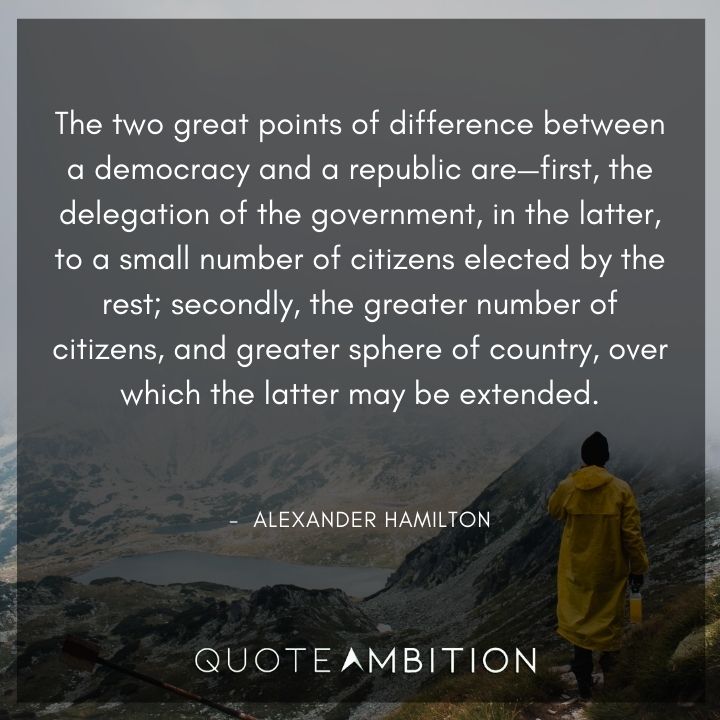
80. “The two great points of difference between a democracy and a republic are—first, the delegation of the government, in the latter, to a small number of citizens elected by the rest; secondly, the greater number of citizens, and greater sphere of country, over which the latter may be extended.”
81. “The airy phantoms that flit before the distempered imaginations of some of its adversaries would quickly give place to the more substantial forms of dangers, real, certain, and formidable.”
82. “Necessity, especially in politics, often occasions false hopes, false reasonings, and a system of measures correspondingly erroneous.”
Alexander Hamilton Quotes on Man’s Nature and Development
83. “It will be of little avail to the people that the laws are made by men of their own choice, if the laws are so voluminous that they cannot be read, or so incoherent that they cannot be understood.”
84. “To all general purposes, we have uniformly been one people—each individual citizen everywhere enjoying the same national rights, privileges, and protection.”
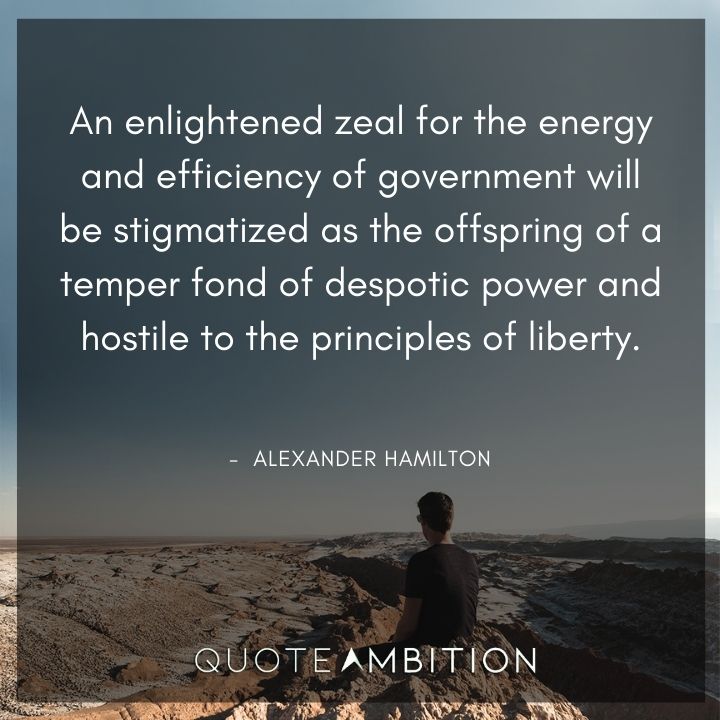
85. “An enlightened zeal for the energy and efficiency of government will be stigmatized as the offspring of a temper fond of despotic power and hostile to the principles of liberty.”
86. “If men were angels, no government would be necessary.”
87. “Ambition, avarice, personal animosity, party opposition, and many other motives not more laudable than these, are apt to operate as well upon those who support as those who oppose the right side of a question.”
88. “A dangerous ambition more often lurks behind the specious mask of zeal for the rights of the people than under the forbidden appearance of zeal for the firmness and efficiency of government.”
89. “I always feel how necessary you are to me. But when you are absent, I become still more sensible of it, and look around in vain for that satisfaction which you alone can bestow.”

90. “Experience is the oracle of truth; and where its responses are unequivocal, they ought to be conclusive and sacred.”
91. “The masses are asses.”
92. “If the sword of oppression be permitted to lop off one limb without opposition, reiterated strokes will soon dismember the whole body.”
93. “She is the best of wives and best of women.”
94. “A strong body makes the mind strong. I advise the gun. While this gives moderate exercise to the body, it gives boldness, enterprise, and independence to the mind.”
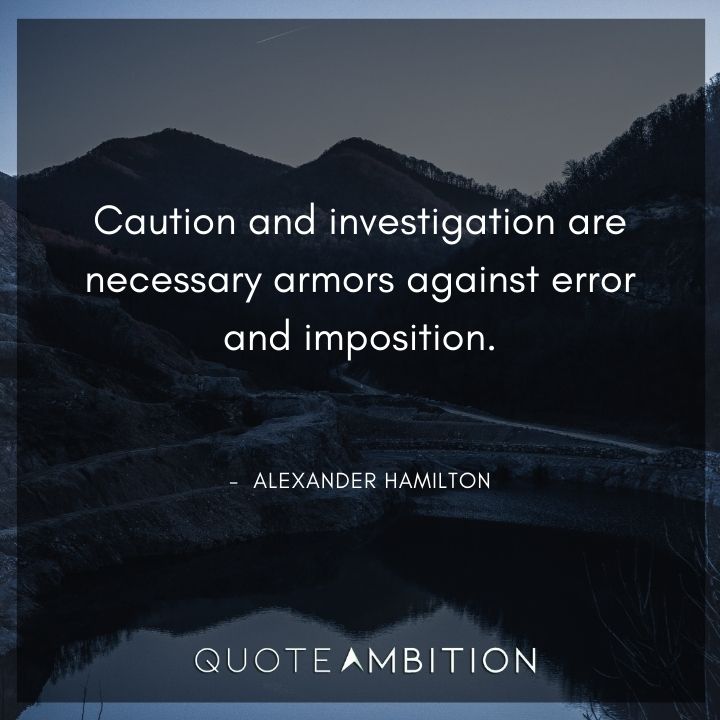
95. “Caution and investigation are necessary armors against error and imposition.”
96. “Every man is bound to answer these questions to himself, according to the best of his conscience and understanding, and to act agreeably to the genuine and sober dictates of his judgment.”
97. “No partial motive, no particular interest, no pride of opinion, no temporary passion or prejudice, will justify to himself, to his country, or to his posterity, an improper election of the part he is to act.”
98. “Cold in my professions; warm in my friendships. I wish, my dear Laurens, it might be in my power, by action rather than words, to convince you that I love you.”
99. “The pains taken to preserve peace include a proportional responsibility that equal pains be taken to be prepared for war.”
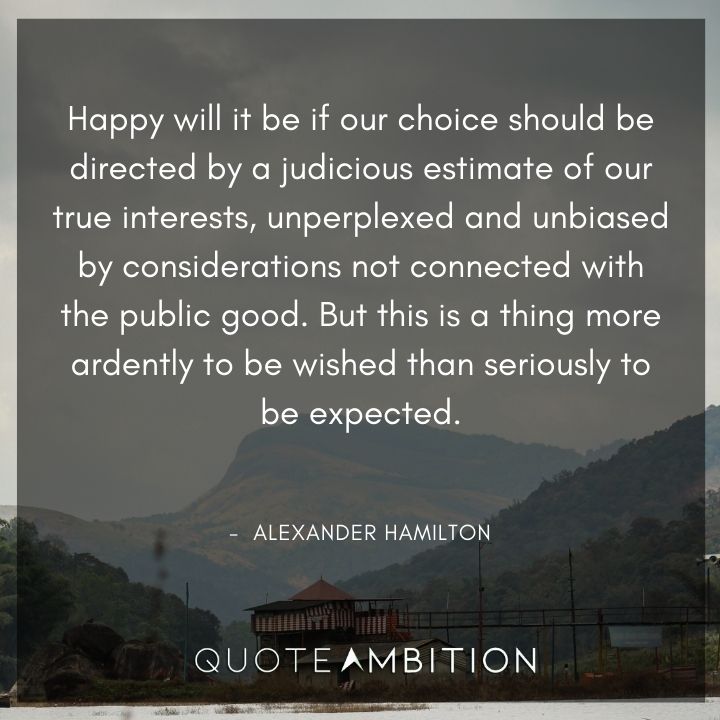
100. “Happy will it be if our choice should be directed by a judicious estimate of our true interests, unperplexed and unbiased by considerations not connected with the public good. But this is a thing more ardently to be wished than seriously to be expected.”
101. “An avaricious man might be tempted to betray the interests of the state for the acquisition of wealth.”
102. “Happy it is when the interest which the government has in the preservation of its own power, coincides with a proper distribution of the public burdens, and tends to guard the least wealthy part of the community from oppression!”
103. “However anxiously we may wish that these complaints had no foundation, the evidence of known facts will not permit us to deny that they are in some degree true.”
104. “No man is allowed to be a judge in his own cause, because his interest would certainly bias his judgment, and not improbably, corrupt his integrity.”

105. “Farewell—a long farewell to my greatness!”
106. “The wisdom of precaution is evident from the cry which has been raised against it; as that very cry betrays a disposition to question the great and essential truth which it is manifestly the object of that provision to declare.”
107. “But the most common and durable source of factions has been the various and unequal distribution of property.”
108. “I cannot make everybody else as rapid as myself.”
109. “Opinion, whether well or ill-founded, is the governing principle of human affairs.”
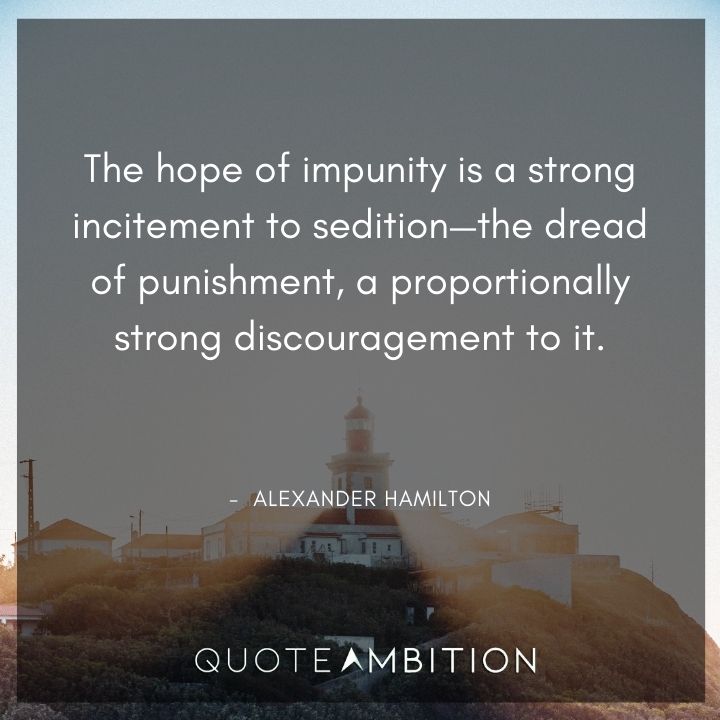
110. “The hope of impunity is a strong incitement to sedition—the dread of punishment, a proportionally strong discouragement to it.”
111. “The pride of states, as well as of men, naturally disposes them to justify all their actions, and opposes their acknowledging, correcting, or repairing their errors and offenses.”
112. “Seditions and insurrections are, unhappily, maladies as inseparable from the body politic as tumors and eruptions from the natural body.”
113. “When the sword is once drawn, the passions of men observe no bounds of moderation.”
114. “Persons of this character will proceed to an examination of the plan submitted by the convention, not only without a disposition to find or to magnify faults, but will see the propriety of reflecting—that a faultless plan was not to be expected.”

115. “The faculties of the mind itself have never yet been distinguished and defined, with satisfactory precision, by all the efforts of the most acute and metaphysical philosophers.”
116. “Sense, perception, judgment, desire, volition, memory, and imagination are found to be separated by such delicate shades and minute gradations that their boundaries have eluded the most subtle investigations and remain a pregnant source of ingenious disquisition and controversy.”
117. “Perspicuity, therefore, requires not only that the ideas should be distinctly formed, but that they should be expressed by words distinctly and exclusively appropriate to them.”
118. “All extremes are pernicious in various ways.”
119. “I am aware that a man of real merit is never seen in so favorable a light as seen through the medium of adversity.”

120. “Love is a sort of insanity.”
Did These Alexander Hamilton Quotes Make You Look Up to Him as a Role Model?
Alexander Hamilton was a self-taught orphan who rose up from a poor upbringing to become one of America’s greatest men. He laid out the foundations of the country’s financial systems, which later became the model of the modern financial system. We learn from his accounts that the way to greatness is to work hard and fight for a cause you believe in—this, too, paved the way for him to become one of George Washington’s indispensable aides during the American Revolutionary War.
Do you see Alexander Hamilton’s influences in today’s financial systems? Which quotes did you relate to the most? Let us know by commenting down below.
